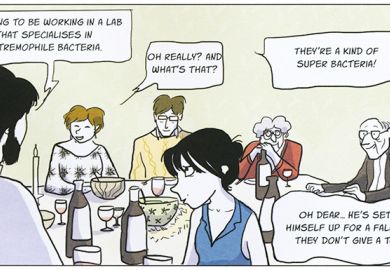When the heroine of Karin Bodewits’ novel, You Must Be Very Intelligent: The PhD Delusion, arrives at the University of Edinburgh to start a doctorate in chemistry, she feels “excited and privileged”, convinced that researchers are “driven by the desire to make the world a better place”. By the time she gains her PhD, she realises that it means “marginally less than a Girl Guides’ camping badge”.
Along the way, the heroine (also called Karin) learns many sobering lessons. She soon discovers that she has been allocated neither a desk nor a computer, and her first encounter with her morose colleagues leaves her “feeling like a five-year-old who has had her favourite balloon burst by laughing bullies”.
Karin is forced to “beg and beg and beg, just to buy basic stuff for research”; she has to make do with “a second-hand tabletop centrifuge that Marie Curie would have called an antique”. Her supervisor, Mark, subjects her to “intense, piercing, self-dramatising” monologues and creates “a work environment where dislike and suspicion are cooked up as efficiently as any compound in a test tube”. On the days after his football team has lost a match, it is always a mistake to come into work early.
Lab romances and one-night stands are rarely a good idea, the novel makes clear, but they are nevertheless inevitable, given that researchers “are spending most of our [waking] lives in a small room together…and we are not like pandas, which can exist in a cage for years only sharing shoots of bamboo”.
The novel paints a pretty bleak picture, so how faithfully does it reflect Dr Bodewits’ own life?
She studied for a PhD at Edinburgh from 2007 to 2011, abandoned a possible scientific career and “struggled emotionally” for the following year, while coordinating a research group at a university in Munich. Dr Bodewits then set up a company delivering talks and seminars about women in science, and she has often given encouragement and support to people who have been “damaged” and “psychologically broken” by the experience of doing a PhD.
The novel, Dr Bodewits explained cautiously, is not directly autobiographical although it was inspired by her time in Edinburgh, and some of the characters are “mixtures of real people”. Yet she did not write it as “a revenge book”, but rather as “a wake-up call about the power plays between supervisors and students”, she added.
Many universities, she went on, “have BSc and MSc student satisfaction as a very high priority – students are almost a bit spoiled. In contrast, PhD student satisfaction does not seem to be the focus of attention. Striking a better balance here would be good.”
The hiring process for academics, Dr Bodewits added, “should pay more attention to whether someone is a good leader, as well as a good scientist”. She argued that supervisors could be sent on leadership courses, rated by students after they finish their PhDs or encouraged to “pop into each other’s labs to see what is happening, if people are happy or not, and why”.
matthew.reisz@timeshighereducation.com
Karin Bodewits’ You Must Be Very Intelligent: The PhD Delusion is published by Springer.
Register to continue
Why register?
- Registration is free and only takes a moment
- Once registered, you can read 3 articles a month
- Sign up for our newsletter
Subscribe
Or subscribe for unlimited access to:
- Unlimited access to news, views, insights & reviews
- Digital editions
- Digital access to THE’s university and college rankings analysis
Already registered or a current subscriber?




